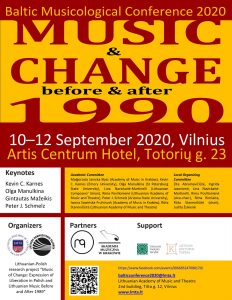Baltic Musicological Conference 2020
On 10–12 September 2020, the Department of Music History at the Lithuanian Academy of Music and Theatre, the Lithuanian-Polish research project “Music of Change: Expression of Liberation in Polish and Lithuanian Music Before and After 1989” and the Musicological Section of the Lithuanian Composers’ Union organize the Baltic Musicological Conference 2020 “MUSIC AND CHANGE BEFORE AND AFTER 1990”.
There is a possibility to attend the event virtually via ZOOM and Youtube.
The employment of music as a form of cultural opposition and transformative power is a multifunctional process that implies an extension of the thematic and disciplinary borders to the complex relations of the music’s cultural, socio-economic, and political contexts. However, such approach requires to provide a space for deep engagements in music and its various worlds overcoming a simplified understanding of musical practices as a reflection of social structures and political processes. As Jacques Attali writes on the relationship between music and societal structures, music “makes audible the new world that will gradually become visible, that will impose itself and regulate the order of things; it is not only the image of things, but the transcending of the everyday, the herald of the future” (Attali 1985).
Baltic Singing Revolution – “revolution by singing and smiling” (Heinz Valk 1988) – is a widely known example of the public expressive cultural practice which had a stimulating effect on cultural imagination and political change. Remembering the year 1990, so important but not limited to national histories of Lithuania, Latvia and Estonia, the Baltic musicological conference 2020 aims to acquire new knowledge and a deeper understanding of the ways in which the musical expression of liberation and musicians’ networks contributed to political and cultural change before and after the end of the Cold War. In what ways the musical practices contributed to formation, negotiation and transformation of sociocultural identities and changing collectivities? What has been the relationship between the processes of cultural and political change before and after 1990? What were prominent ideas, landmark cultural texts and influential individuals who have had a formative and transformative power in these processes? To address these issues, as well as any other questions and topics related to the 20th–21st-century music and change in the widest sense, we invite the proposals for the Baltic musicological conference 2020, to be held at the Lithuanian Academy of Music and Theatre in Vilnius 10–12 September 2020. The conference will include international guest speakers Kevin C. Karnes (Emory University), Olga Manulkina (St Petersburg State University), Gintautas Mažeikis (Vytautas Magnus University) and Peter J. Schmelz (Arizona State University).
Academic committee
Małgorzata Janicka-Słysz (Academy of Music in Kraków), Kevin C. Karnes (Emory University), Olga Manulkina (St Petersburg State University), Lina Navickaitė-Martinelli (Lithuanian Composers’ Union), Rima Povilionienė (Lithuanian Academy of Music and Theatre), Peter J. Schmelz (Arizona State University), Iwona Sowińska-Fruhtrunk (Academy of Music in Kraków), Rūta Stanevičiūtė (Lithuanian Academy of Music and Theatre).
Local organizing committee
Ingrida Jasonienė, Lina Navickaitė-Martinelli, Rima Povilionienė (vice-chair), Rima Rimšaitė, Rūta Stanevičiūtė (chair), Judita Žukienė.
2020 09 03

